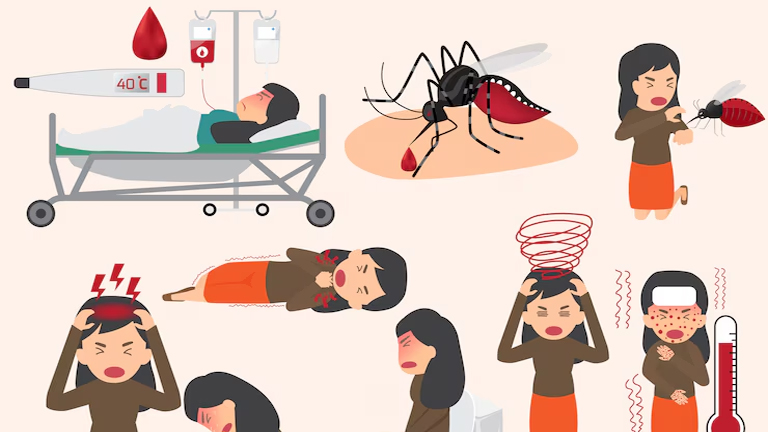Dengue fever is a mosquito-borne viral infection that poses a significant public health threat, particularly in tropical and subtropical regions. With millions of cases reported annually, understanding dengue fever—its causes, symptoms, treatments, and prevention methods—is crucial for global health awareness.
This comprehensive guide explores everything you need to know about dengue fever, including its transmission, risk factors, and effective prevention strategies to keep you and your family safe.
Must Check: Pneumonia Symptoms
What Is Dengue Fever?
Dengue fever is an infectious disease caused by the dengue virus (DENV), which is transmitted primarily by Aedes mosquitoes, particularly Aedes aegypti and Aedes albopictus. The virus has four distinct serotypes (DENV-1, DENV-2, DENV-3, and DENV-4), and infection with one serotype provides lifelong immunity only to that specific strain.
How Dengue Spreads
-
Mosquito Bites: The primary mode of transmission is through the bite of an infected female Aedes mosquito.
-
Human-to-Mosquito Transmission: A mosquito becomes infected after biting a dengue-infected person and can then spread the virus to others.
-
Rare Cases: Dengue can also spread through blood transfusions, organ transplants, or from mother to child during pregnancy.
Symptoms of Dengue Fever
Dengue fever symptoms typically appear 4–10 days after infection and can range from mild to severe. The disease is categorized into three phases:
1. Mild Dengue Fever
-
High fever (104°F or 40°C)
-
Severe headache
-
Pain behind the eyes (retro-orbital pain)
-
Muscle and joint pain (often called “breakbone fever”)
-
Nausea and vomiting
-
Swollen glands
-
Skin rash (appearing 2–5 days after fever)
2. Dengue Hemorrhagic Fever (DHF) – Severe Form
-
Persistent vomiting
-
Severe abdominal pain
-
Bleeding gums or nose
-
Blood in urine, stool, or vomit
-
Rapid breathing
-
Fatigue and restlessness
3. Dengue Shock Syndrome (DSS) – Life-Threatening Complication
-
A drastic drop in blood pressure
-
Weak pulse
-
Cold, clammy skin
-
Organ failure
Warning Signs of Severe Dengue:
-
Severe abdominal pain
-
Persistent vomiting
-
Bleeding from gums or nose
-
Blood in stool
-
Rapid breathing
-
Extreme fatigue
Causes and Risk Factors of Dengue Fever
Primary Cause: Dengue Virus Transmission
The dengue virus is spread through the bite of infected Aedes mosquitoes, which thrive in urban and semi-urban areas with stagnant water.
Risk Factors
-
Geographical Location: Tropical and subtropical regions (Southeast Asia, Latin America, Africa, and the Pacific Islands) are high-risk areas.
-
Previous Infection: A second infection with a different serotype increases the risk of severe dengue.
-
Weakened Immune System: Individuals with compromised immunity are more susceptible.
-
Urbanization: Poor sanitation and water storage practices facilitate mosquito breeding.
-
Climate Change: Rising temperatures and rainfall expand mosquito habitats.
Diagnosis of Dengue Fever
Doctors use several diagnostic methods to confirm dengue infection:
-
Blood Tests
-
NS1 Antigen Test: Detects the virus in the early stages (first 5 days).
-
PCR Test: Identifies viral genetic material.
-
Serology Tests (IgM/IgG): Detects antibodies after 5–7 days of infection.
-
-
Complete Blood Count (CBC)
-
Low platelet count (thrombocytopenia)
-
Increased hematocrit levels (indicating plasma leakage)
-
Treatment for Dengue Fever
There is no specific antiviral treatment for dengue fever. Management focuses on relieving symptoms and preventing complications.
1. Home Care for Mild Dengue
-
Stay Hydrated: Drink plenty of fluids (water, oral rehydration solutions).
-
Pain Relief: Use acetaminophen (paracetamol) for fever and pain.
-
Avoid NSAIDs: Ibuprofen and aspirin can increase bleeding risk.
-
Rest: Adequate rest helps recovery.
2. Hospital Treatment for Severe Dengue
-
Intravenous (IV) Fluids: To prevent dehydration and shock.
-
Blood Transfusion: Required if severe bleeding occurs.
-
Platelet Transfusion: For critically low platelet counts.
Prevention of Dengue Fever
Since no widely available dengue vaccine exists for all populations, mosquito control is the best prevention method.
1. Mosquito Bite Prevention
-
Use Insect Repellent: DEET, picaridin, or oil of lemon eucalyptus.
-
Wear Protective Clothing: Long sleeves and pants in high-risk areas.
-
Install Window Screens: Keep mosquitoes out of living spaces.
-
Use Mosquito Nets: Especially during daytime naps (Aedes mosquitoes are daytime biters).
2. Eliminate Mosquito Breeding Sites
-
Remove Stagnant Water: Empty flower pots, buckets, and tires.
-
Cover Water Storage Containers: Prevent mosquito egg-laying.
-
Clean Gutters: Ensure proper drainage.
3. Community Efforts
-
Fogging and Larviciding: Local governments should conduct mosquito control programs.
-
Public Awareness Campaigns: Educate communities on dengue prevention.
4. Dengue Vaccine (Limited Availability)
-
Dengvaxia (CYD-TDV): Approved in some countries for individuals aged 9–45 with prior dengue infection.
-
Qdenga (TAK-003): A newer vaccine showing promise in clinical trials.
Complications of Dengue Fever
If untreated, dengue can lead to severe complications:
-
Severe Bleeding (hemorrhagic fever)
-
Organ Damage (liver, heart, or brain)
-
Dengue Shock Syndrome (DSS)
-
Death (in extreme cases)
Dengue Fever vs. Other Mosquito-Borne Diseases
| Disease | Virus/Bacteria | Primary Symptoms | Mosquito Vector |
|---|---|---|---|
| Dengue Fever | Dengue Virus (DENV) | High fever, joint pain, rash | Aedes aegypti |
| Malaria | Plasmodium parasite | Fever, chills, anemia | Anopheles mosquito |
| Zika Virus | Zika Virus | Mild fever, rash, birth defects | Aedes mosquito |
| Chikungunya | Chikungunya Virus | Severe joint pain, fever | Aedes mosquito |
Global Impact of Dengue Fever
-
400 million infections annually (WHO estimates).
-
100+ countries at risk, including parts of the USA (Florida, Texas) and Europe.
-
Economic Burden: High healthcare costs and lost productivity.
Conclusion
Dengue fever remains a major global health challenge, especially in tropical regions. While mild cases can be managed at home, severe dengue requires immediate medical attention. Prevention through mosquito control is the most effective way to reduce dengue transmission.


